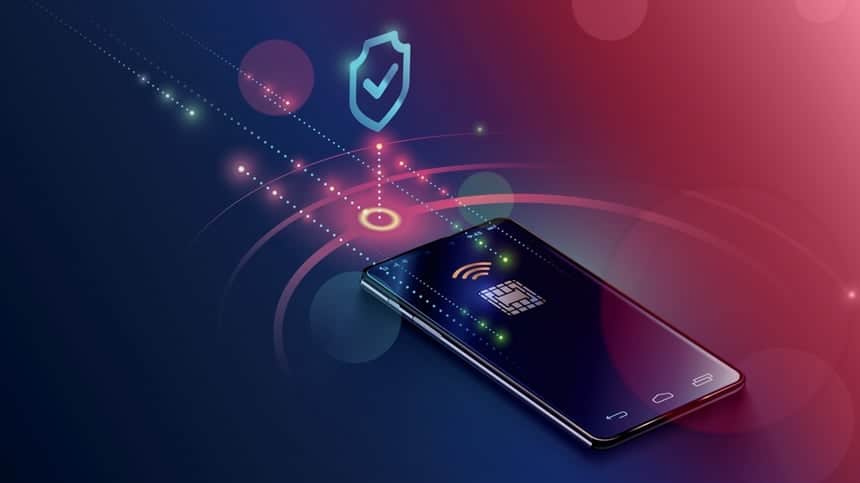What is Mobile Security?
Today, we are living in a technologically advanced world. This evolution in the field of technology has helped us in multiple ways. Yet, it has caused sagacious changes in the organization of information systems and has, therefore, become the cause of new perils. Mobile device security refers to the measures aimed at protecting the portable devices you carry with you, such as smartphones, laptops, wearables, and tablets, from threats and vulnerabilities associated with using these in the way they were intended – digitally connected via mobile networks. Some of these measures to protect mobile devices can be supplied by your network provider.
Why is Mobile Security Important?
As we move into the environment where our lives are conducted through our mobile devices, mobile security is a Must. Securing portable devices from mischievous software, data leakage, and other mobile threats has become increasingly important as the number of devices and the way those devices are used are expanding drastically.
Most commonly, users and businesses use mobile devices not only for the sake of communication but also to plan and organize their user’s work and personal life. A lack of mobile device security can lead to a compromised employee, business, or customer data. Smartphones continue to be a user preference over desktops, but they are more susceptible and vulnerable to attackers and data breaches.
The attackers can exploit weaknesses inherent in smartphones that can come from communication modes like Short Message Service (SMS), Multimedia Messaging Service (MMS), Wi-Fi, Bluetooth, as well as the protocols and standards that underpin the mobile networks. Smartphones collect and compile an increasing amount of sensitive information to which access must be controlled to protect the user’s privacy and the company’s intellectual property.
Security violations can cause global disturbance in the business, including complicating IT operations and affecting user productivity if systems fail or are compromised. Mobile device security is essential for regulatory compliance, security policy enforcement, application control, automated device registration, and data backup. It also protects an enterprise from unknown or malicious outsiders accessing sensitive company data.
Another important feature of mobile device security is that by diligently adhering to the mobile security best practices, an organization may be able to prevent ransomware attacks that target mobile devices. Malware attacks are a common mobile security concern.
Types of Mobile Security Threats
As Mobile devices become increasingly popular, they have received additional attention from cybercriminals. Attackers intend to disrupt or steal insider information from mobile devices through different cyber-attack techniques.
These cyber-threats can be in the form of malicious software or spyware, giving cybercriminals and fraudsters unauthorized access to a device; in many cases, users aren’t even aware that an attack has occurred.
Mobile security threats can come from a variety of places. These include the potential for malicious apps, network-level attacks, and exploitation of vulnerabilities within the devices and the mobile OS (Operating System). Some even come from embedded components not often visible to us. For more information on this type of threat, please visit our blog on the Simjacker.
Cybercriminals and financially motivated data seekers can exploit these vulnerabilities and cause harm or damage to the user and the organization:
- They seek sensitive information, trade secrets, business secrets, and unauthorized access to a secure network to find anything that could be beneficial for them and for those who hired them.
- By gaining access, fraudsters can perform multiple mischievous actions, from data-stealing and selling to accessing contacts.
- Login credentials, insider information, trade secrets, business secrets, and spoof identities can also be stolen. These cybercriminal attacks can influence users and organizations alike, as one single breach could lead to large-scale data leaks.
Other Forms of Mobile Cyber Threats:
Threats can also come in other forms that can be disruptive in our everyday lives, such as:
- Phishing Scams: Mobile device users are more susceptible and vulnerable to the number one mobile security threat because mobile device users are always active. According to research, Smartphone users are more susceptible because they often monitor their email in real-time, checking emails when they are received. Cybercriminals can also send short messaging service (SMS), commonly known as text messages, designed to pretend as though coming from legal sources, using fake hyperlinks. It is highly possible you could click a mischievous link and unintentionally cause a virus to spread through your device.
Discover How to Spot Scam Text Messages >
- Unsecured Wi-Fi: In this form of mobile device security threat, cybercriminals set up a fake Wi-Fi network (known as network spoofing) to trick users. A spoofed network will allow the data seekers to compromise the devices and sensitive information. Fraudsters can interfere with traffic and steal insider information through man–in–the–middle (MitM) attacks.
- Data Leakage: Data leakage can happen through free mobile applications found in the app stores that work as advertised but also send private and potentially concerted data to a hidden server, where advertisers and fraudsters mine it. These cybercriminals and fraudsters can be financially motivated.
- Cryptojacking: It’s a form of a threat in which the cybercriminal steals the computer power of an individual mobile user to mine cryptocurrencies such as Bitcoin, affecting the processing power and effectiveness
- Mobile Ransomware: The increased usage of mobile devices has made this fraud more common in which the mobile ransomware encrypts files on a mobile device and demands a ransom payment for the decrypted file to restore.
- Physical Threats: Inability to use a strong password, PIN, biometric authentication, or insider information can make your phone susceptible to hacking.
Conclusion
Subscribers are growing in security awareness and should report any suspected fraudulent or nefarious activity to their mobile network operators. More and more subscribers are selecting mobile network operators offering security as a differentiating factor. Some other tips for subscribers to better protect themselves from mobile security threats, is to follow our guidelines: think before clicking on a link, sharing any personal information, or connecting to a public Wi-Fi network. Also, before downloading any app, pay special attention to the type of information you will be accepting to share.
Operators can also proactively protect their subscribers by securing their networks with Enea AdaptiveMobile Security’s comprehensive Messaging Firewall and Managed Threat Intelligence. So, they can block and prevent mobile attacks.
By protecting over 2.4 billion subscribers, Enea AdaptiveMobile Security is the world leader in securing mobile networks and messaging service ecosystems by delivering threat protection, revenue protection, and intelligence.


